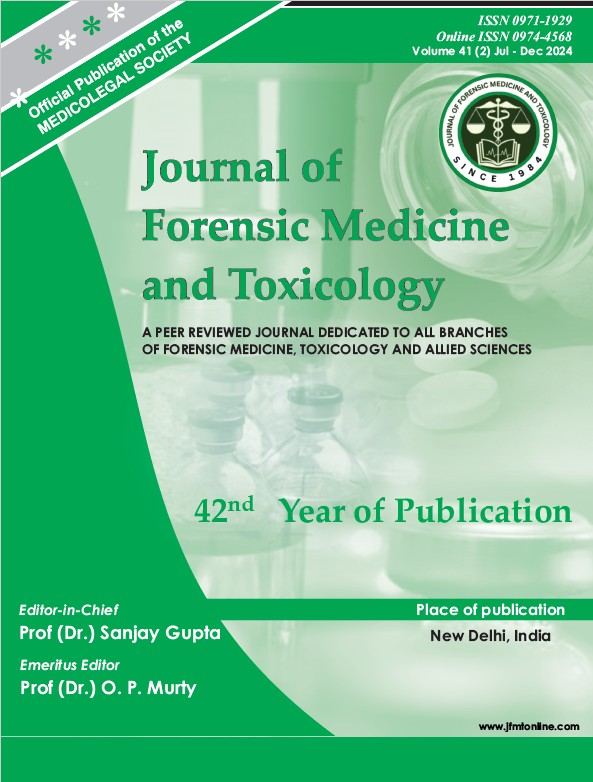Medical Certification of Cause of Death (MCCD) for Brought Dead Cases in India- A legal perspective.
DOI:
https://doi.org/10.48165/jfmt.2025.42.3.17Keywords:
MCCD, Cause of Death, Brought dead, Registration of Deaths.Abstract
The Medical Certification of Cause of Death (MCCD) is a critical document serving legal, statistical, and public health purposes by recording the medically certified cause of death. However, certifying deaths becomes particularly challeng ing when individuals are “brought in dead” (BID) or declared “dead on arrival” (DOA) at hospitals. In such cases, the absence of prior medical history and unclear circumstances make it inappropriate for primary practitioners to issue MCCD without further evaluation. Certifying such deaths carries legal and ethical implications, especially in suspected unnatural deaths, where police inquests and post-mortem examinations under BNSS Section 194 are required. As per the Registration of Births and Deaths Act, 1969 [Section 10(2) & (3)], only registered medical practitioners who attended the patient during terminal illness are authorized to issue death certificates. As per National Medical Commission guide lines (Professional Conduct, Etiquette and Ethics Regulations, 2002) personal examination of the body before certifi cation is mandatory. Despite its importance, MCCD coverage and quality in India remain inadequate, averaging only 20%. Common deficiencies include incomplete, incorrect, or illegible entries. Strengthening hospital protocols, involving forensic experts, and providing regular training to medical staff are essential tools to improve accuracy. Additionally, establishing audit committees to review MCCD documentation can enhance accountability. Improving awareness and adherence to existing guidelines will enable MCCD to function more effectively as a tool for justice, health surveillance, and public policy.
Downloads
References
Lewis G. Beyond the Numbers: reviewing maternal deaths and complications to make pregnancy safer. Br Med Bull. 2003 Dec 1;67(1):27–37. doi:10.1093/bmb/ldg009.
Kumar A, Agrawal N. Brought in dead: an avoidable delay in maternal deaths. J Obstet Gynaecol India. 2016 Oct;66(Suppl 1):60–6. doi:10.1007/s13224-015-0762-1. PMID: 27651579; PMCID: PMC5016403.
World Health Organization. Recommendations for conducting an external inspection of a body and filling in the medical certificate of cause of death, Version: 2023 [Internet]. WHO; 2023 [cited 2023 Jun 1]. Available from: https://www.who.int/publications/m/item/who-recommendations-for-conducting-an-external-inspection-of-a-body-and-filling-in-the-medical-certificate-of-cause-of-death
Office of the Registrar General, India. Physicians’ manual on medical certification of cause of death. New Delhi: Ministry of Home Affairs, Government of India; 2012 [cited 2025 Jun 14]. Available from: https://ncdirindia.org/e-mor/Download/Physician’s_Manual_MCCD.pdf
World Health Organization. ICD-10: International Statistical Classification of Diseases and Related Health Problems, 10th Revision, Version: 2016 [Internet]. Geneva: WHO; 2016 [cited 2025 Jun 14]. Available from: https://icd.who.int/browse10/2016/en
TNN. Stark rise in number of brought-dead cases [Internet]. Times of India. 2024 Jun 21 [cited 2025 Jun 14]. Available from: https://timesofindia.indiatimes.com/city/delhi/rise-in-brought-dead-cases-at-ddu-hospital/articleshow/111150027.cms
Ministry of Law and Justice. Bharatiya Nagarik Suraksha Sanhita (BNSS), 2023 [Internet]. New Delhi: Legislative Department, Government of India; 2023 [cited 2025 Mar 17]. Available from: https://www.mha.gov.in/sites/default/files/2024-04/250884_2_english_01042024.pdf
Office of the Registrar General, India. Report on medical certification of cause of death – 2022. New Delhi: Ministry of Home Affairs, Government of India; 2022. Available from: https://dc.crsorgi.gov.in/assets/download/AnnualReports/mccd/2022.pdf
Government of India. Registration of Births and Deaths Act, 1969 [Internet]. New Delhi: India Code; 2016 [cited 2025 Jun 14]. Available from: https://www.indiacode.nic.in/handle/123456789/1682?sam_handle=123456789/1362
Ministry of Law and Justice. The Bharatiya Nyaya Sanhita, 2023 [Internet]. New Delhi: Legislative Department, Government of India; 2023 [cited 2025 Mar 17]. Available from: https://www.mha.gov.in/sites/default/files/
National Medical Commission. Code of Medical Ethics Regulations, 2002 [Internet]. New Delhi: NMC; 2002 [cited 2025 Jun 14]. Available from: https://www.nmc.org.in/rules-regulations/code-of-medical-ethics-regulations-2002/
Rukmini S. Mortality in India [Internet]. Data for India. 2024 [cited 2024 Nov 1]. Available from: https://www.dataforindia.com/population-mortality




